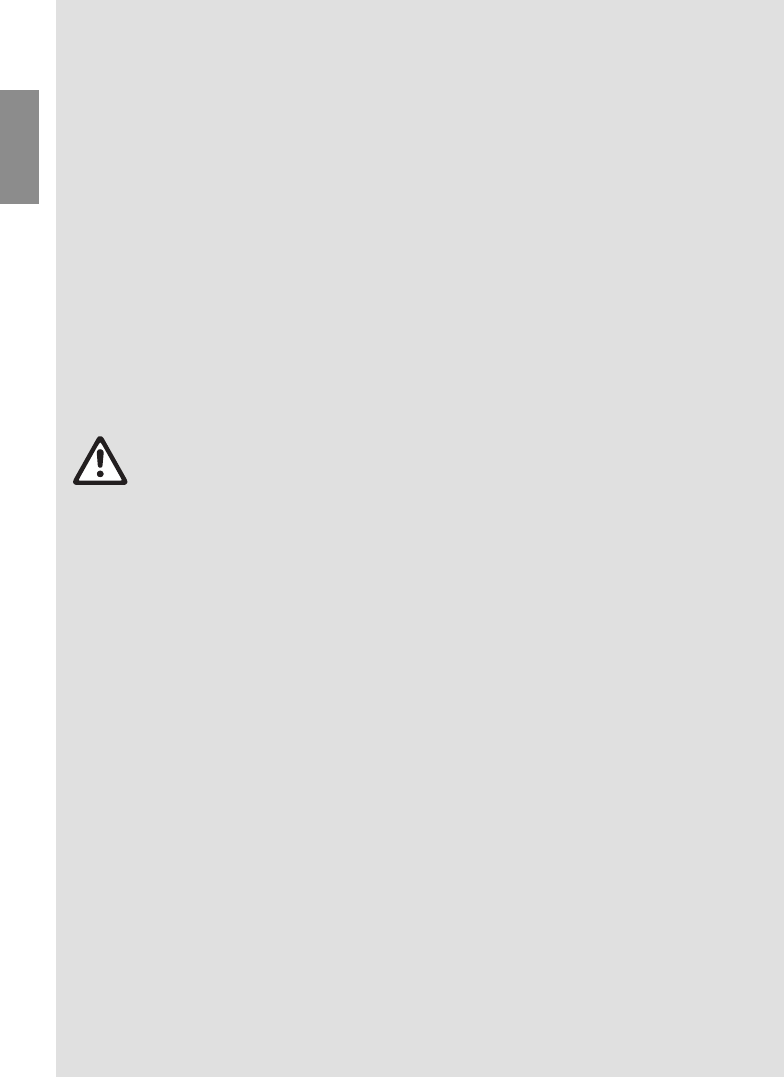
12
GB
Checks before each use:
v Inspect the Electric Lawn Scarifier before
each use.
v Do not use the Electric Lawn Scarifier if
safety devices (starter lever, safety inter-
lock, rear flap, housing) are damaged or
worn.
v Never operate the unit with the safety
devices by-passed or missing.
v Note: Ensure that all nuts, bolts and screws
are tight and that the Lawn Scarifier is in
good working order.
v Inspect the area to be aerated before be-
ginning work.
v Check the working area for foreign objects
(e.g. stones, branches, string) and remove
if necessary.
Proper use/ Responsibility:
Danger! Risk of injury!
The Lawn Scarifier can cause seri-
ous
injuries!
V Keep hands and feet away from the
aerator cylinder.
You are responsible for the safety of the work-
ing area.
v Only use the Electric Lawn Scarifier for the
purposes specified in these instructions.
v Only work when visibility is good.
v During use do not tip the unit and do not
open the rear flap.
v Familiarise yourself with the surroundings
of your working area. Check for possible
risks which might be not audible due to
the noise of the machine.
v Wear sturdy shoes and long trousers to
protect your legs.
v Ensure you keep your feet a safe distance
from the moving parts.
v Make sure that there are no other people
(especially children) or animals anywhere
near the working area.
v Always push the Lawn Scarifier at a walking
pace.
v Operating position: Ensure that you have a
secure foothold when working.
v Be particularly careful if you change
direction on a slope.
Attention! Take extra care when walking
backwards.You may stumble!
v Do not use the Lawn Scarifier if it is raining
or in moist, wet conditions.
v Do not work close to the edge of swimming
pools or garden ponds with the lawn
scarifier.
v Please observe any local restrictions relat-
ing to noise levels.
Electrical safety:
v Keep the extension cable away from the
aerator cylinder!
v Never use the Electric Lawn Scarifier when
it is raining.
v Please observe the prescribed local quiet
times.
v The connecting/extension cable must be
checked regularly for damage and signs of
wear and tear.
v Disconnect the mains plug immediately if
the connecting/extension cable is damaged
or severed.
The coupling socket for the extension cable
must be waterproof for protection from water
splashes or the connection sockets for exten-
sion cables must be made of rubber or be
encased in rubber.
Extension cables must meet the requirements
of DIN VDE 0620.
v Only use approved extension cables with
an adequate cable cross-section. Ask your
electrician.
Attachment fittings must be used for extension
cables.
For portable units, which are used outdoors,
we recommend to use a residual-current
device having a residual-current rating
≤ 30 mA. In Switzerland use of a residual-
current device is obligatory.














